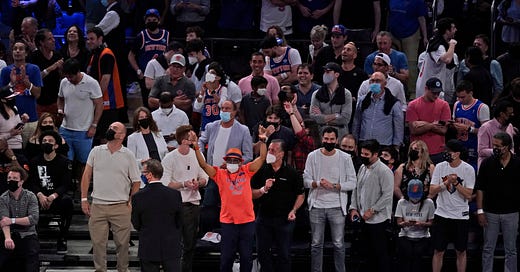The Importance of Crowds
If you’ve watched even 30 seconds of the NBA playoffs so far, you’ve probably heard the announcers talk about how great it is to have fans back in the arenas. Honestly, it’s a little much. All the talk about what an improvement it is might make you feel stupid for having enjoyed any bubble basketball. But it is clearly nicer to have fans at the games. The stunned silence after Trae Young’s game-winner was only possible without 15,000 live fans—the largest indoor event in New York since the pandemic started.
And live fans are important beyond sentimental feelings about atmosphere and trash talk. Over the last several decades, the sports business has evolved from primarily a live events business into primarily a broadcasting business. That change is the major reason why team values, and player salaries, have skyrocketed in that period. Of course, revenues from in-person attendance are still huge, and important to a team’s bottom line, as the 2020 baseball season revealed.*
*Of course, team owners almost never open their books, and so obviously we should take claims about the size of their losses with a grain of salt. But, still, it was clearly a big hit to not have live fans.
But the primacy of TV and streaming is clear in how the game is now optimized for TV viewers over live fans, with breaks for replays and commercials and explanations by referees/umpires. On some level, this makes sense, since there are always way more people watching the game on TV then at the actual stadium or ballpark. So other than some concerns about pace of play, it’s not so bad for fans that the screen experience gets prioritized over the in-game one.
The problem, though, is how it’s changing the business model of sports. As long as fans were the ultimate customers, in the form of ticket sales, or merchandise, then, according to the crude logic of capitalism, they were stakeholders in the game. Even as games moved to TV, fans were still the end customers, given the nature of the cable TV business. The regional sports networks (RSNs) that air games, and which are often owned by the teams themselves, get most of their money not from advertising, but from the carriage fees that cable companies pay per subscriber. So while it was less direct than buying a ticket, local fans were still putting money in their team’s coffers by paying their cable bill.
Now, though, with the rise of cord-cutting and the switch to streaming services, that model appears to be dying. And, as the rise of Big Tech has taught us, if you are not the customer, then you’re the product. That seems to leave two equally horrifying possible futures.
The first is the purely ad-supported model that can be seen in this year’s Tokyo Olympics. As an international competition, the Olympics does not have “local fans.” Over 90% of the revenue of the International Olympics Committee comes from advertising, either in ad-supported broadcasting fees or direct corporate sponsorships. As a result, the IOC is accountable to international corporations and TV networks, and certainly NOT its host city. The Olympics already has a reputation for leaving host cities decimated when they leave, but this year’s games are more extreme than ever. Japan is in the middle of a public health emergency, polls show overwhelming opposition to hosting the games by Japanese citizens, and the public health consensus is that there is no safe way to hold the games. And yet the IOC is plowing forward, heedless of these dangers, because it has no real ties to Japan, and is primarily loyal to advertisers.
The other model is the streaming model that can be seen in HBO Max, Peacock, or the WWE Network. That is, sports leagues become entertainment companies that use their backlog of content to launch their own streaming services to compete with Netflix or Amazon Prime. These are not ad-supported, but in some ways they are even more predatory—designed to monopolize your attention and extract your data in more insidious ways. Ultimately, the model is built on obtaining monopoly power and then degrading the product once you cannot opt out of it.
Luckily, neither fate is necessary! Live crowds and local TV still bring in plenty of money, more than enough to support the operating costs and large salaries. If only that were to satisfy the rapacious demands for unrelenting growth inherent to capitalism…



